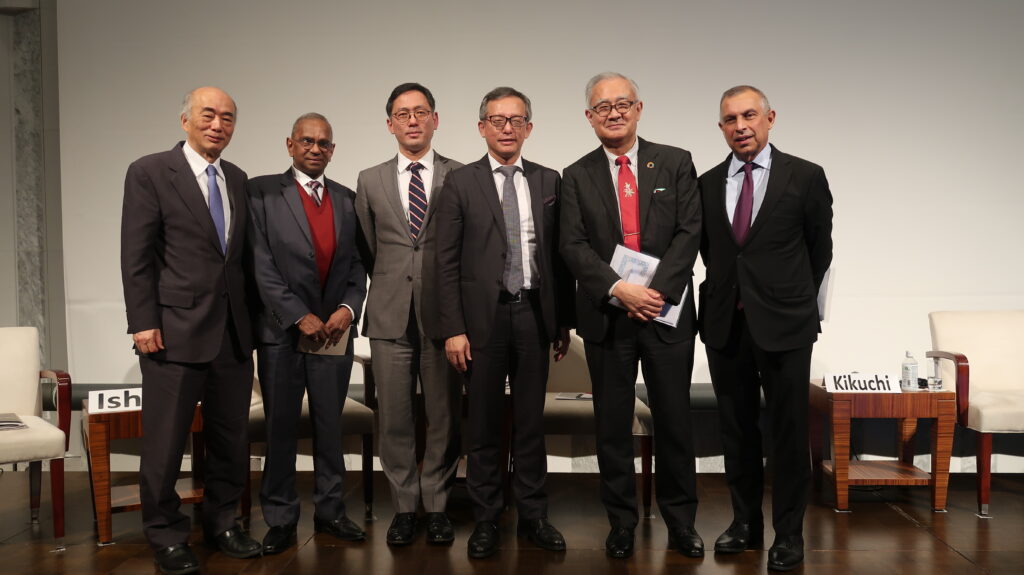Media Release
For Immediate Release
Singapore and ASEAN could thrive amidst global turmoil
Singapore, 6 October 2022 – Nations are facing unprecedented challenges amidst a confluence of structural shifts in the global order. Regional cooperation and long-term resilience must be strengthened for ASEAN to emerge not just unscathed, but well-positioned to capture opportunities in the current crises.
This was a recurring message at the 14th ASEAN and Asia Forum x Dialogue on Sustainable World Resources (AAF x SWR), a conference organised by the Singapore Institute of International Affairs (SIIA) on 6 October 2022 at Four Seasons Hotel Singapore.
In his keynote address, Dr. Tan See Leng, Singapore’s Minister for Manpower and Second Minister for Trade and Industry, commented, “Amidst recent challenges, ASEAN and Asia presents immense growth potential”.
He added, “Within ASEAN, we need to double down our efforts at regional integration and deepen the region’s connectivity with the rest of the world.”
With more than 300 participants from a wide range of backgrounds and sectors, the AAF x SWR brought in key regional corporate leaders, industry experts, policymakers, and decision-makers together to discuss how ASEAN can seize opportunities arising from current global trends. The theme for the 14th AAF x SWR was “Regional Opportunities, Fractured World Order”.
In the panel, “Navigating a Fractured Global Order”, speakers discussed geopolitical risks that nations and businesses must contend with in an increasingly polarised world.
“Even in war-like conditions, pressures of inflation and recession and the COVID-19 shipwreck, some countries can do very well. If you can supply the need, you can prosper even in a time when there is an overall storm,” said Associate Professor Simon Tay, Chairman of the SIIA.
This year, the 14th AAF was held in conjunction with SIIA’s Dialogue on Sustainable World Resources (SWR), discussing the impact of high energy prices and inflation on renewable energy projects and emissions reduction efforts.
Mr. Colin Chen, Managing Director, Head of ESG Finance APAC, MUFG Bank, said, “The things that we have assumed to be certain over a number of years, such as cheap capital, certainties in policy, and certainties in supply of energy from traditional sources, have all gone out the window.”
Mr. Chen added that interest in renewable energy projects has gone up, “In the medium to long term, we will see the expansion of renewable energy. The sun shines every day, the wind blows, there’s waves that come in – those are not subject to geopolitical developments. There’s a certain security in that.”
Amidst global uncertainty, it is also crucial for ASEAN to push forward with digitalisation. The panel, “ASEAN’s Next Wave of Growth: Innovation, Interoperability and Inclusion”, explored challenges facing the region’s digitalisation, and how the digital economy can bring inclusive growth for all levels of society.
On Asia emerging as a digital innovation capital, Mr. Kiren Kumar, Deputy Chief Executive, Infocomm Media Development Authority (IMDA) Singapore, remarked, “Companies are not just coming to Southeast Asia to cut, copy and paste what they have in their markets.” He added “[Companies] are coming here to innovate in Asia for Asia, building new products for the market.”
Mr. Leo Jiang, Chief Digital Officer, Huawei said, “Digital businesses are integral towards ASEAN’s social and digital prosperity”. He added, “companies like Huawei contribute towards a vibrant global start-up system, a key engine for innovation”.
At the forum, the SIIA launched a working paper on “Addressing the Risk of Carbon Leakage: Assessing the EU’s Carbon Border Adjustment Mechanism (CBAM)”, which is now available for download. The working paper explains the risk of carbon leakage, where efforts to reduce carbon emissions within a country might effectively be counteracted by carbon emissions in other nations. The European Union is expected to become the first jurisdiction to introduce measures against carbon leakage, and the paper examines the implications for ASEAN and Asian economies that trade with the EU. The study was produced with the support of the Hinrich Foundation.
The 14th AAF x SWR was made possible by the following sponsors:
- Key Sponsors – Hong Kong Economic and Trade Office in Singapore, Moody’s Investors Service, MUFG
- Sponsors – Huawei, PSA Singapore
For further enquiries, please contact the SIIA:
Media Contact
Mr. Wong Jun Hao
Policy Research Analyst, Policy Programme
Email: junhao.wong@siiaonline.org
About the Singapore Institute of International Affairs
Insights ● Networks ● Access
Established in 1962, the Singapore Institute of International Affairs (SIIA) is a non-profit and independent think tank committed to producing policy analysis, fostering in-depth dialogues and bridging gaps between policymakers, private sector decision-makers and experts to shape public policy and social responses. Centred around ASEAN focused themes, the institute aims to deliver policy analysis in international affairs and on issues driving environmental sustainability. The SIIA has been consistently ranked as one of the leading think tanks in Southeast Asia and the Pacific, in the Global Go To Think Tank Index by the University of Pennsylvania. Since 2017, the SIIA was ranked the No. 1 independent think tank in Asia. It was also recognised as one of the top 50 think tanks globally, excluding the United States of America. For two consecutive years since 2019, it was recognised as the No. 1 think tank in South Asia, Southeast Asia, and the Pacific (excluding India). In 2020, it was also recognised as one of the think tanks with the best policy and institutional response to the COVID-19 pandemic.
About the SIIA’s ASEAN Programme
The SIIA’s ASEAN programme produces policy analyses and facilitates dialogue on how politics and socioeconomic policies in ASEAN impact business and investment in the region. Also closely watched are emerging trends in key economies as well as ASEAN’s relations with major partners China, Japan, the USA and the EU. In recent years, the SIIA has done key work on Myanmar and Indonesia, providing assistance and advice in close cooperation with their government agencies. Key research output includes special reports evaluating the changing political and economic landscape as well as the business and investment opportunities of the respective countries. Key platforms developed by the SIIA to facilitate dialogue are the ASEAN and Asia Forum (AAF) and the ASEAN Myanmar Forum (AMF). These events bring policy makers and the business community together to facilitate dialogue about the region’s political, economic and strategic challenges.
About the SIIA’s Sustainability Programme
The SIIA’s Sustainability Programme was established in 1997 when it organised Singapore’s first haze dialogue with the Singapore Environment Council. Since then, the Sustainability Programme has evolved to address a range of sustainability issues ASEAN faces. The Programme continues to focus on the forestry sector, as well as using green finance and carbon financing as levers to advance supply chain sustainability and drive Southeast Asia’s green recovery from the COVID-19 pandemic.
As part of its Sustainability Programme, the SIIA facilitates dialogues between governments, private sector, academia and NGOs. One of the SIIA’s key platforms is its flagship event, the Singapore Dialogue on Sustainable World Resources (SDSWR), launched in 2014. The annual event attracts about 300 high-level participants to discuss best practices, new commitments and noteworthy cross-sector collaborations in ASEAN’s resource sector.




